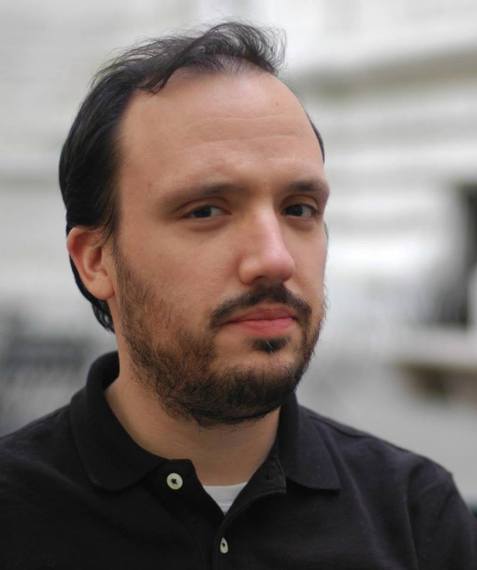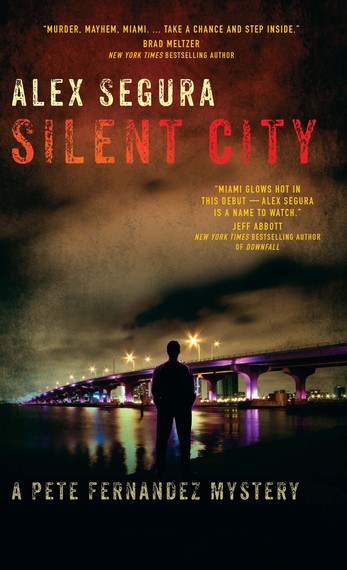Alex Segura's Silent City is a gritty murder mystery/detective story set in Miami among the ruins of the old guard media as everyone is grasping for straws. A compelling, mystery novel, as well as a contemporary look at life at the slowly disintegrating world of newspapers. Segura talks about his novel and current state of affairs.
Miami is as much a character as any of the others in Silent City. How did you develop this idea?
It really just came down to it being my first novel and wanting the setting to be as genuine as possible. When I first started writing Silent City, I'd been in New York for only a few years, so I didn't feel like I had a good handle on the city. So, the only other option was to write about Miami -- where I was born and raised. I also felt like I wanted to write a story about my Miami, the city the tourists don't see, beyond the beaches and TV versions. And while there are some great Miami crime novels, like Vicki Hendricks' Miami Purity, for example -- I felt like I had more to add to that region than by writing another PI novel set in New York. That's been done before by a lot more people, and I wanted to maybe swim in a smaller, more familiar pond to start.
You write (excruciatingly) close to life about a lot of characters in this post-old media world, yet chose a very old fashioned sort of way to tell the story; that's sort of meta (and could work really well in a movie); were you aware of this, going in?
I did want to add a bit of media commentary, where possible. Having worked in newspapers -- both on the print side and online -- I got to see both sides of the equation. I moved away from journalism early in the evolution of new media, so I didn't really experience a lot of the harsher stories, including layoffs and reduced editions, that my friends and contemporaries did. But I think having that initial experience helped me write a -- hopefully -- genuine version of what it's like to work at a newspaper. I didn't want to try and provide any solutions. If anything, you really just get Pete's view of things, which is fairly jaded and muddled.
Going in, I had a loose idea of what themes and topics I wanted to touch on when writing. But my main goal was to write a book I wanted to read -- a fun, quick and pulpy noir mystery that left me wanting to know more about the characters. The other layers -- the commentary on print media, fathers and sons and the cultural landscape of Miami -- were important, but wouldn't really matter if the story didn't work.
How much of your own life informed this story?
I think your life informs everything you write -- from an email to a thank you card. But this book in particular features a lot from my life, but isn't autobiographical. I knew I wanted to write a story about someone who was not a refined and developed detective or private eye. I wanted to show the origin of the protagonist, and see how he went from a "regular" guy to someone that is much more than that. I wasn't interested in writing about a fedora-wearing, whiskey-drinking, smooth operator who has to find a femme fatale's missing sister. I think that's been done to death and much better than I could ever do. When I first got into reading crime fiction, after powering through the classics like Chandler, MacDonald and Jim Thompson, a friend of mine handed me a copy of George Pelecanos' A Firing Offense -- and it all clicked for me after that. Here was a book that read like a great Replacements record, that had this sloppy, post-punk energy to it and featured a star that was a screw-up and wasn't always going to do the right, or badass thing. I could really relate to that, and I think it's someone who's lived through their twenties could relate to, as well. We all make mistakes. Nothing's perfect. Sometimes you drink too much or say the wrong thing -- and there are consequences. So, Pelecanos opened the door to so many great writers for me, including Dennis Lehane, Megan Abbott, Laura Lippman, Richard Price, I could go on. And that's what really spurred me on to write my own book. Once I knew I was going to do this -- you know, beyond the 'Oh, I'd like to write a novel' thing -- once I was actually coming home from work and typing every night. That's when I knew I wanted it to be about Miami, about a washed up journalist dealing with the times and his life passing him by and I wanted him to be like me in that he's Cuban, deals with that dual culture to some degree and also is very much a modern American guy. So, in that regard, my life influenced it a lot. But Pete and I are very different. I've never touched a gun and I'm not nearly as much fun as parties.
When can we expect the sequel?
We're shooting for the end of this year. The book is written and I'm knee-deep in revisions now. It's called Down the Darkest Street and it's a much, much harsher book. I don't want to minimize Silent City at all, because I think it does a nice job of setting up Pete's world, but I do think this book takes everything up a notch -- and all the key players that survived the first book are back to deal with a much deadlier problem.
Alex Segura is a novelist, comic book writer and musician. He is the author of the Miami noir novel Silent City from Codorus Press, and the best-selling and critically acclaimed Archie Meets Kiss storyline and graphic novel. Alex also performs regularly in New York as part of the indie rock group, Faulkner Detectives. He lives in New York with his wife and two cats. He is a Miami native.


